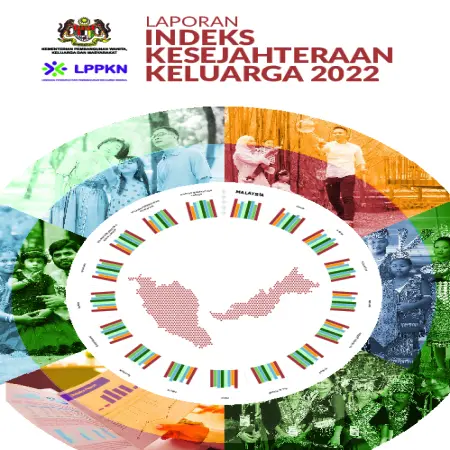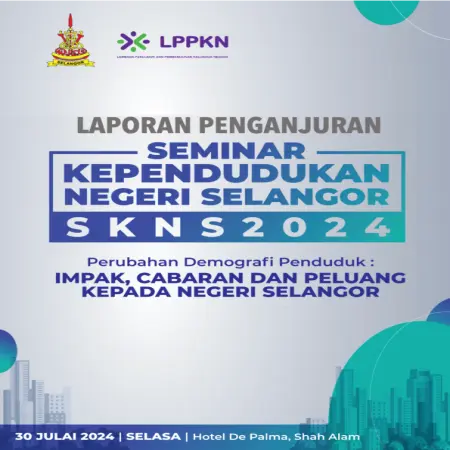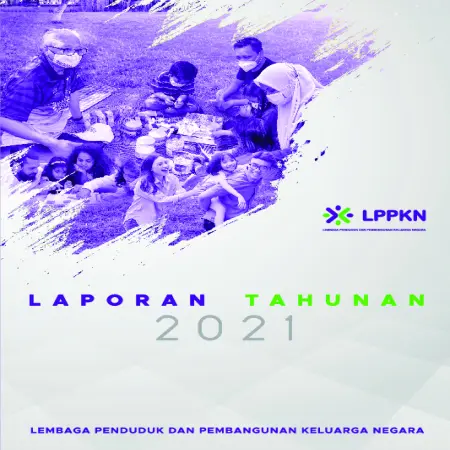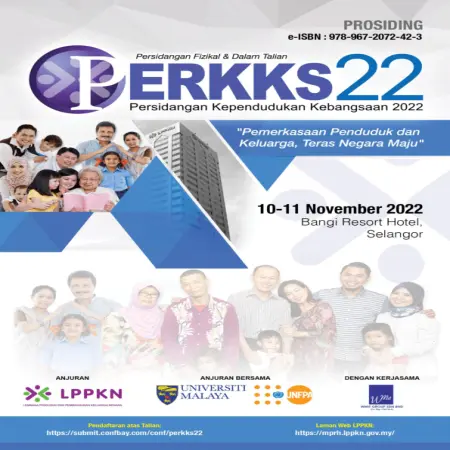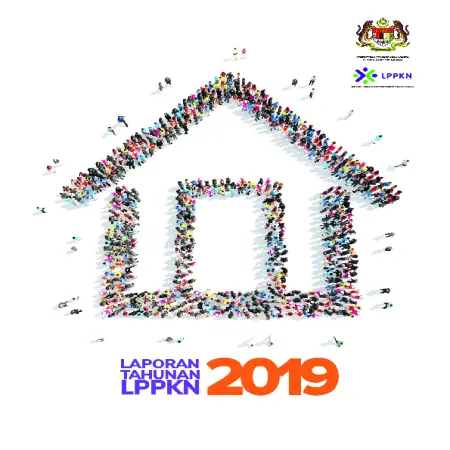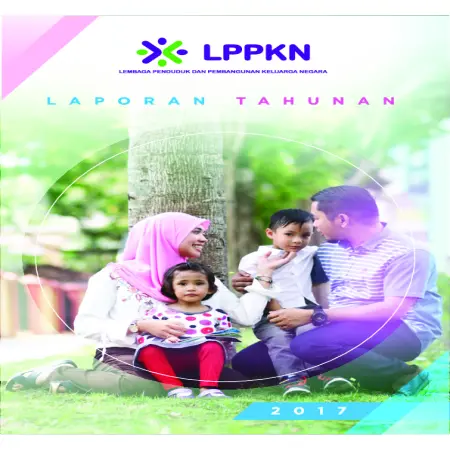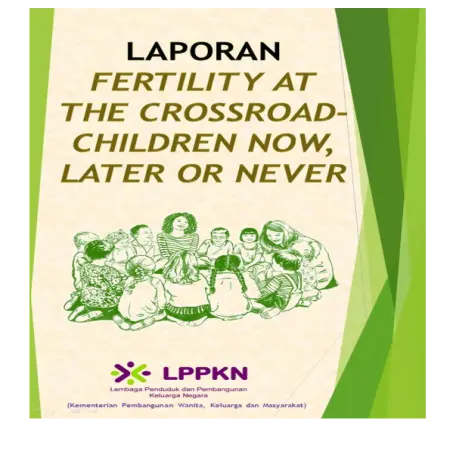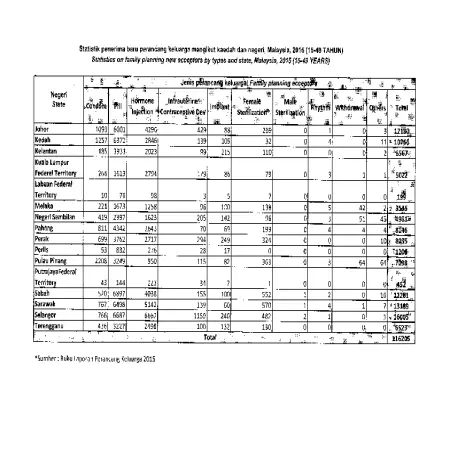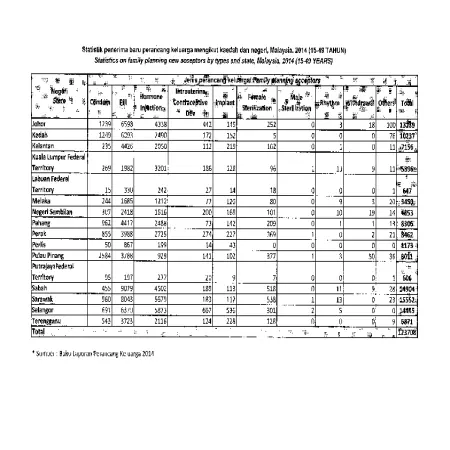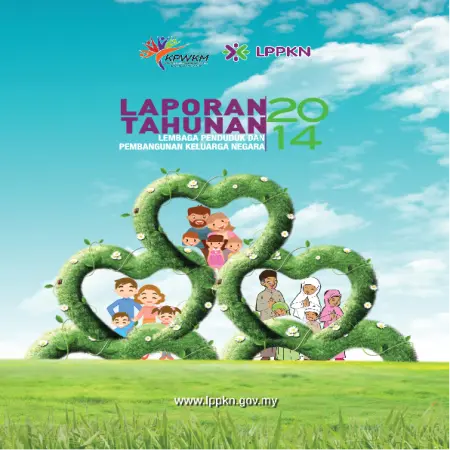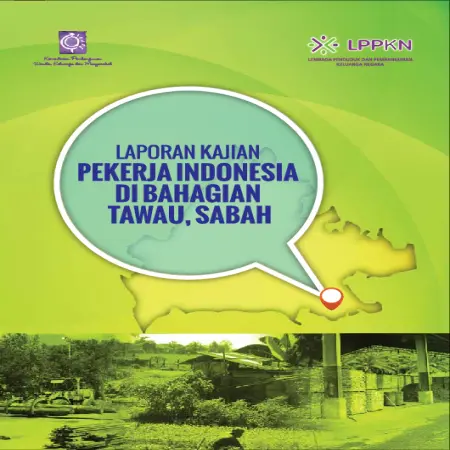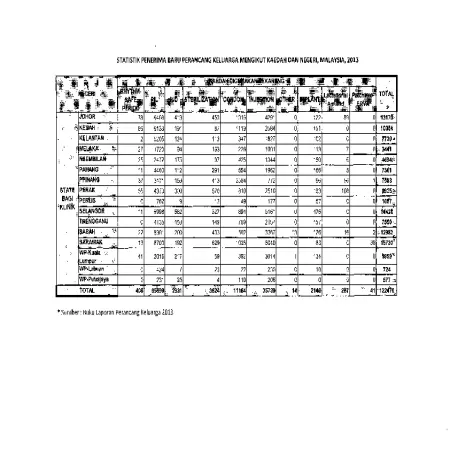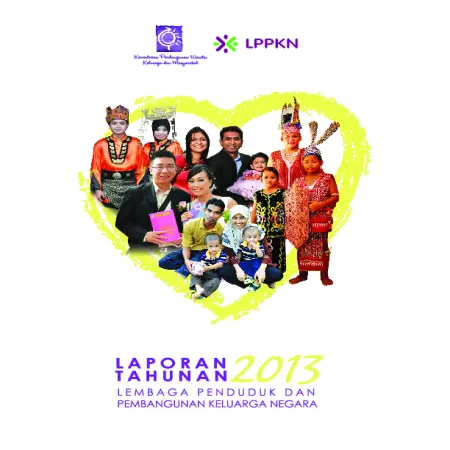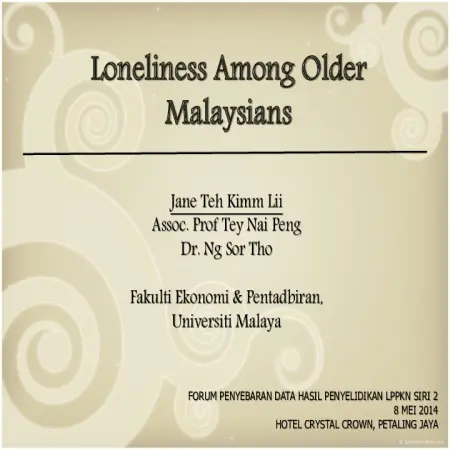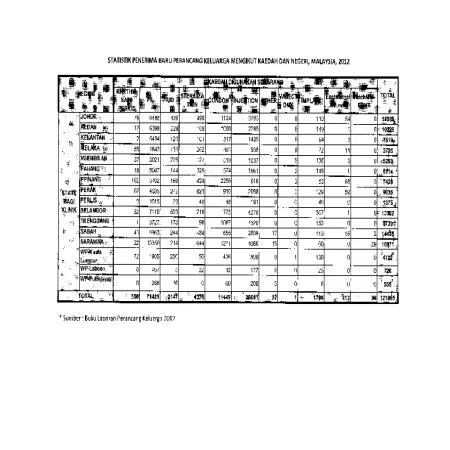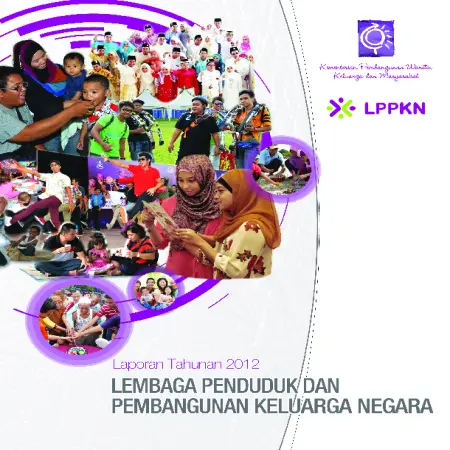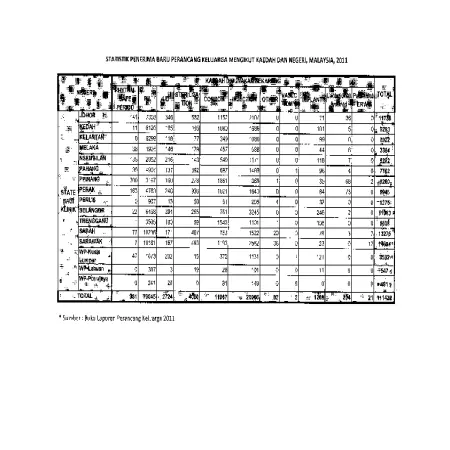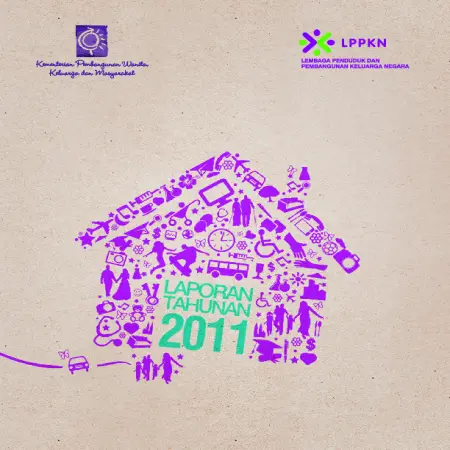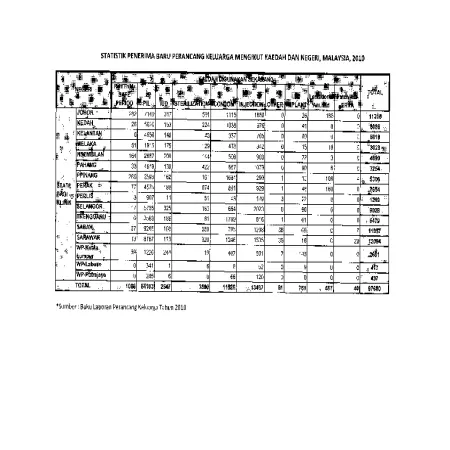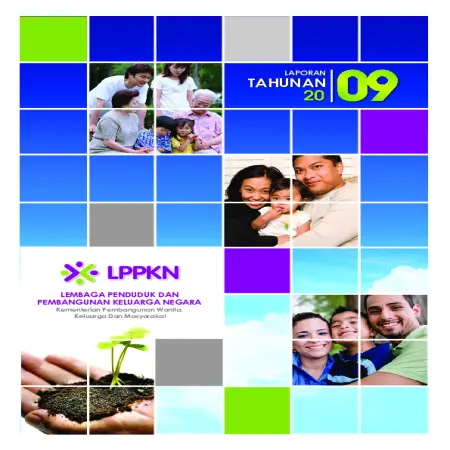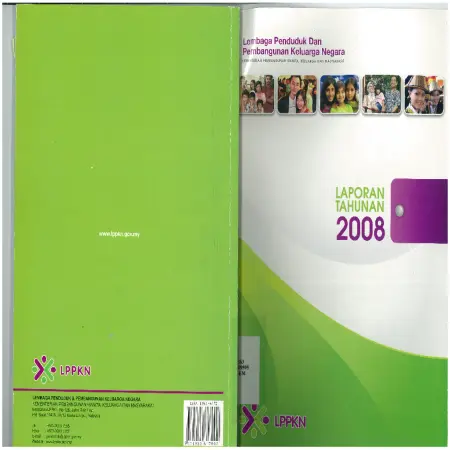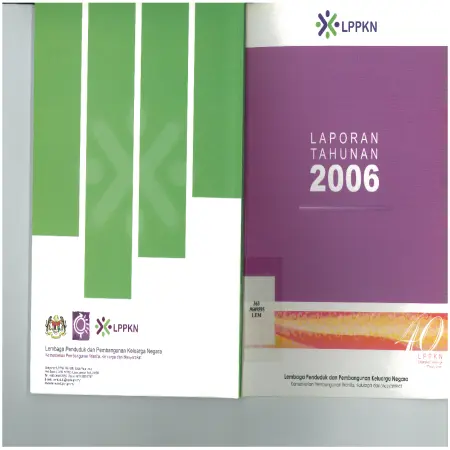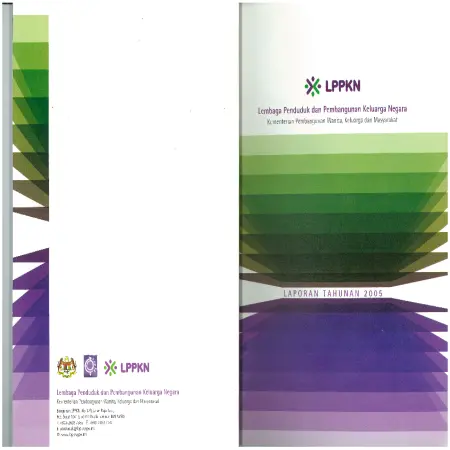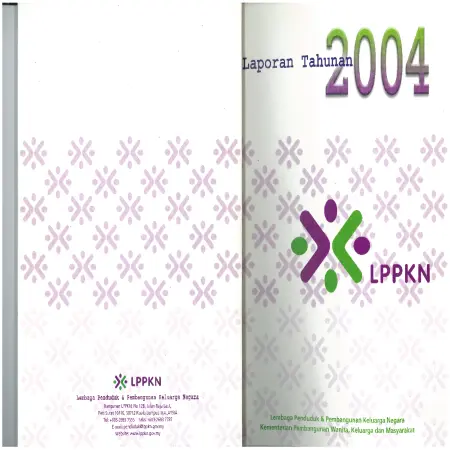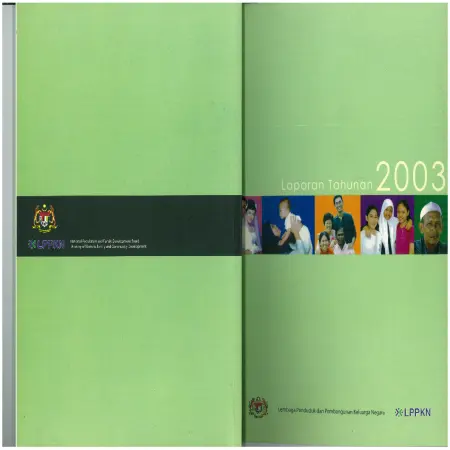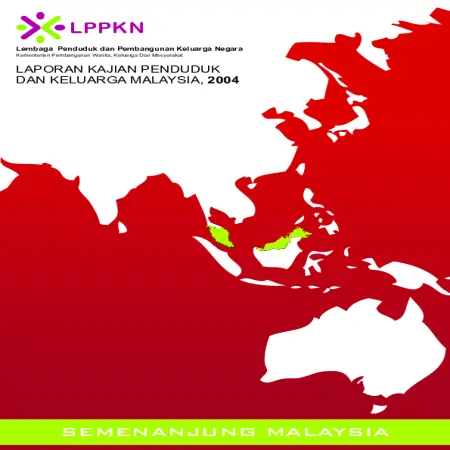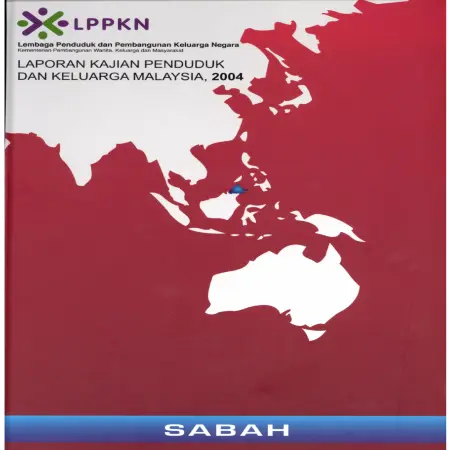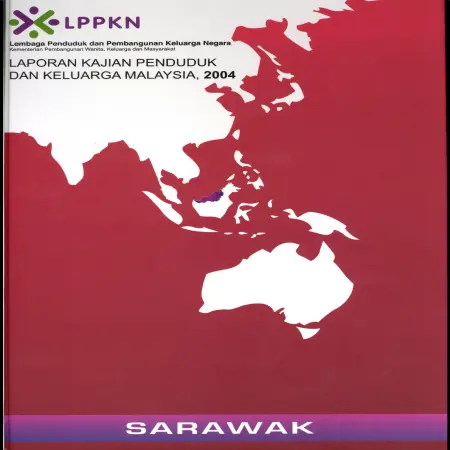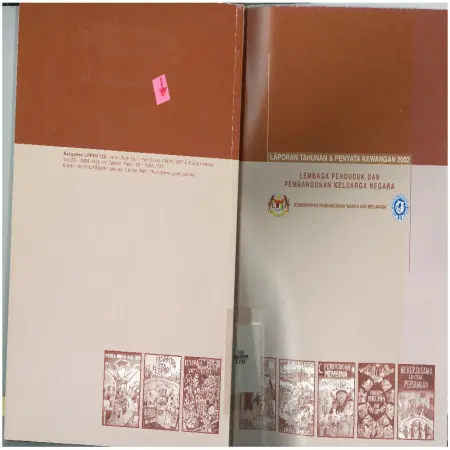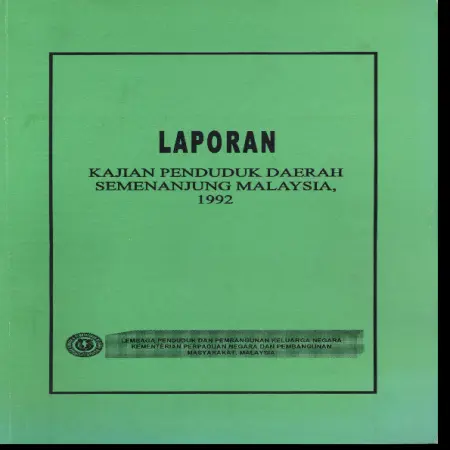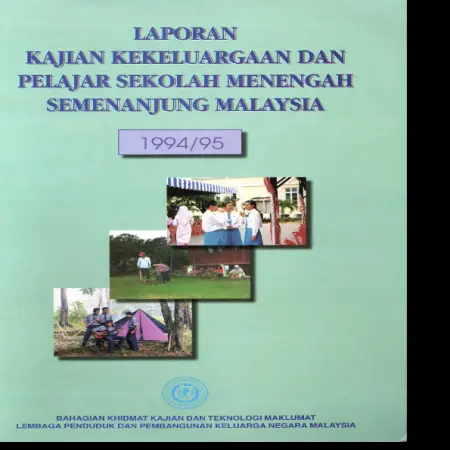Advanced Search
2025 (1)
|
|
Laporan Indeks Kesejahteraan Keluarga (IKK) 2022
Item Type: Research Report
Editor:
Year: 00/03/2025
Abstract: The National Population and Family Development Board (LPPKN) established a new framework for family research in Malaysia by introducing the Family Well-Being Index (FWBI) in 2011 to measure the level of family well-being. To continue the effort of measuring and monitoring family well-being, LPPKN conducted the fourth series of the FWBI Study in 2022 and subsequently published the 2022 Family Well-Being Index Report (FWBI 2022).
Out of 8,460 households visited, a total of 5,236 respondents were successfully interviewed, consisting of 2,784 (53.2%) fathers and 2,452 (46.8%) mothers. The majority of respondents were aged between 40 and 49 years, Malay, still married, had secondary education, and resided in urban areas. More than two-thirds (68.9%) of respondents were from the B40 group with a household income of less than RM4,850.00. In terms of family structure, three-quarters (75.3%) of respondents belonged to nuclear households, where the father, mother, and children live together.
The FWBI 2022 showed that the level of family well-being was at a moderate level, with a score of 7.93 out of a maximum scale of 10.00. The 2022 FWBI score recorded an increase of 0.21 points or 2.7 percent compared to FWBI 2019. This improvement was contributed by five domains that scored above 8.00, namely:
(i) Family Relationship Domain (8.44);
(ii) Family, Religion, and Spiritual Practices Domain (8.37);
(iii) Family and Community Involvement Domain (8.24);
(iv) Family and Communication Technology Domain (8.18); and
(v) Family Health Domain (8.07).
|
|
|
|
2024 (1)
|
|
Laporan Penganjuran Seminar Kependudukan Negeri Selangor SKNS 2024
Item Type: Report
Editor:
Year: 00/09/2024
Abstract: The Selangor State Population Seminar 2024 (SKNS 2024), held in conjunction with World Population Day 2024, was organized to discuss policies and measures needed to slow down the declining fertility rate and to prepare the state of Selangor for the rapid pace of demographic change. SKNS 2024 was jointly organized by the Selangor State Government and the National Population and Family Development Board (LPPKN) Selangor, in collaboration with the United Nations Population Fund (UNFPA).
The theme of this inaugural seminar was “Demographic Change: Impacts, Challenges, and Opportunities for the State of Selangor.” Among the issues discussed were the declining fertility rate and its impact on national development, covering four key areas:
i. Socioeconomics
ii. Health and infertility
iii. Policy development
iv. Shared responsibilities
The objective of the seminar was to explore and discuss current demographic dynamics and challenges, as well as their relationship with development, particularly in Selangor. This seminar provided a platform for policymakers, academics, and researchers to present their research findings in the fields of population, family, and reproductive health, and to produce recommendations that could serve as input for policy formulation and the development of appropriate intervention programs by the Selangor State Government.
In addition, the seminar also aimed to gather input and proposals on slowing down the fertility rate in Selangor from participants comprising state government agencies, state-owned enterprises, academics, non-governmental organizations (NGOs), and civil society.
This report serves as the comprehensive and detailed record of SKNS 2024, covering all sessions: opening remarks, officiating speech, keynote address, paper presentations, forums, Q&A sessions, and the closing session, along with recommendations for consideration by the Selangor State Government. The report also includes media coverage generated by SKNS 2024.
|
|
|
|
2023 (1)
2022 (2)
|
|
Long-term care insurance (LTCI) for the ageing society in Malaysia
Item Type: Book Section
Editor:
Year: 00/00/2022
Abstract: The increase in life expectancy and declining fertility rates have contributed to the rising tide of the ageing population in Malaysia. Undeniably, an ageing population poses the need for policy changes to address the economic and social risks caused. Against this backdrop, it is therefore crucial for Malaysia to give serious attention in developing a policy related to long-term care financing.
|
|
|
|
2021 (2)
2018 (2)
|
|
Laporan fertility at the crossroad-children now, later or never
Item Type: Research Report
Editor:
Year: 00/00/2018
Abstract: This study was to identify the socio-economic and psychological factors that influence the decision of women working in the public and private sectors to want to have children now, postpone pregnancy or do not want to have another child/children. It also to identify forms of support that can be provided by employers in an effort to create a family -friendly work environment. Nowadays, the issue of declining fertility rates is becoming a global issue, not just in among developed countries even in developing countries. Most countries have experienced fertility decline since the 1970s. United Nations Projections (UN) indicates most countries in the Asia Pacific region will experience a decline total fertility rate (TFR) until 2015-2030. Countries like China, Japan and Singapore have achieved TFR below the substitution level for decades ago. Rapid socio -economic development in Malaysia over the past five decades
has resulted in a decrease in births and deaths as well as an increase in migration. Malaysia is currently in the second phase of a demographic transition where fertility rates are increasing decreased while the percentage of the elderly population increased. Decrease in rate
mortality and fertility are closely linked to improved quality of life giving
significant impact on the growth and size of the Malaysian population.
|
|
|
|
2017 (1)
2016 (3)
|
|
Living the 'reduce, reuse and recycle' lifestyle
Item Type: Conference or Workshop Item
Editor:
Year: 00/00/2016
Abstract: In this presentation, the author will emphasise the urgency for "living the ‘reduce, reuse & recycle’ lifestyle” because humanity is living well beyond the ecological limits of one planet. Based on ecological footprint analysis, a tool for measuring sustainability, the biocapacity for humanity to be sustainable in 2012 was 1.7 global hectares (gha) per person (Global Footprint Network 2016; EF&B in 2012). Yet, the actual footprint of 2.8gha per person in that year globally indicates we were consuming the resources of 1 ½ planets. When we note further that some countries only survived on the equivalent of 0.7gha per person while others consumed the resources of over four planets at more than 8gha per person, it highlights the inequity of consumption across the human population. If this trend continues without shifting to a ‘reduce, reduce, reduce’ lifestyle, we will not achieve the sustainable development goals or Agenda 2030. Further, we will be borrowing from the future generations and compromising on their ability to meet their own needs. With a footprint of 3.7gha per person, Malaysians are already consuming the resources of more than two planets. Next, consumption patterns in 550 urban households in Malaysia based on data from an EPSM survey will be presented. In order to make the sustainable shift to ‘reduce, reuse & recycle’ lifestyle, an institutional framework needs to be created to mainstream sustainable development, as advocated by EPSM’s ongoing Sustainable Living in Malaysia (SLiM) campaign. Serious efforts need to be made to reduce our consumption of energy (electricity and fuel), water, meat and waste generation, including unnecessary shopping. In conclusion, the author will highlight examples of living the ‘reduce, reuse and recycle’ lifestyles.
|
|
|
|
2015 (3)
|
|
Lima teras keluarga bahagia
Item Type: Article
Editor:
Year: 16/11/2015
Abstract: Each of us has our own values to describe a happy family. Happiness in the family is very important and it is the goal of all of us to build family institutions. National Population and Family Development Board (NPFDB) has outlined five (5) Happy Family Thrusts based on the concept of KASIH, namely Love, Morality, Health, Knowledge and Harmony. Let there be different recipes and molds of pure values that are practiced in the family but the purpose is to create a happy family.
|
|
|
|
2014 (5)
|
|
Laporan Kajian Pekerja Indonesia di Bahagian Tawau, Sabah
Item Type: Research Report
Editor:
Year: 00/12/2014
Abstract: In 2009, the National Population and Family Development (NPFDB) has implemented a Strategic Plan Review Second Population (KPSK-2) which takes consider relevant new policies and scenarios demographics and families as well as changes that occurred over a period of a decade and a half let go. One of the components found in this study is concerned with international migration. Results from KPSK-2 and several surveys specifically that has been done in Sabah, found the presence of foreign workers in that amount large in Sabah has resulted in stress to basic social services in particular from the aspect of health and education. In addition that, it also puts pressure as well security and political concerns. Accordingly, in 2010, Ministry of Women, Family and Development The community through NPFDB has run Study of Indonesian Workers in Tawau Division, Sabah to collect information simultaneously from various categories of respondents consisting of Indonesian workers, residents local and employers who use Indonesian employee services. The main objective of the study this is to collect sociodemographic information of Indonesian workers, entry factors, involvement by sector and type of occupation, the impact of admission on the local population and proposed approaches or measures that suitable for employee management and control Indonesia in this country. The fieldwork of the study has taken time for two weeks i.e. from 24 November to 6 December 2010. The location of this study is in the Tawau Division which covers the district Tawau, Kunak and Semporna. For the election sample of Indonesian workers and employers, framework sampling used in the study this is a list of employers who employ Indonesian workers derived from Department of Manpower of Tawau, Kunak and Semporna. Next, the sampling method on a quota basis and comfortably used to select both categories of respondents. Share selection of local population samples, methods comfortable sampling was used given the absence of a sampling frame locals who have employees Indonesia in their community. As a result, information from 896 Indonesian workers, 787 locals and 37 people employers have been successfully collected. Results of interviews conducted against Indonesian workers, found two main factors their migration to Sabah was for looking for more jobs and income height. In addition, migration factors not an economy like strategic geography, the presence of family or relatives and religious and cultural similarities as well affecting their migration here. Results of interviews with locals in turn found most of them to be of the opinion
that the migration of Indonesian workers here is due to the position factor of Tawau which is located adjacent to Indonesia and following in the footsteps of relatives or friends who have or have worked here. Besides, it is also influenced by the unemployment rate high in their country of origin and opportunity more wide open work here.
|
|
|
|
|
|
Loneliness among older Malaysians
Item Type: Conference or Workshop Item
Editor:
Year: 00/00/2014
Abstract: Loneliness is a prevalent issue among older persons and it is an important indicator of their subjective well-being. Persistent loneliness or extreme cases of loneliness may lead to higher risks of psychological disorder, mental health problems, depression or suicide. Family support is a great importance in determining the quality of life and well-being of older persons. The objective of this study is to examine factors influencing the feeling of loneliness among older Malaysians. We hypothesize that loneliness among older persons varies according to their socio-demographic characteristics and is affected by their health and physical condition and community participation as well as the various forms of family support.
|
|
|
|
2013 (2)
2012 (2)
2011 (2)
2010 (1)
2009 (1)
2008 (1)
2007 (1)
2006 (1)
2005 (1)
2004 (4)
|
|
Laporan Kajian Penduduk dan Keluarga Malaysia, 2004: Semenanjung Malaysia
Item Type: Research Report
Editor:
Year: 00/00/2004
Abstract: The Malaysian Population and Family Survey (MPFS) is a series of studies conducted by the National Population and Family Development Board (NPFDB) every ten years since 1974. This report of the Malaysian Population and Family Survey 2004, Peninsular Malaysia is divided into six main sections, namely population background and households, marriage and fertility, reproductive health and health practices, family life, adolescents, the elderly and singlehood. Analysis as well done by making a comparison with previous MPFS studies and statistical data from the Department of Statistics Malaysia.
|
|
|
|
|
|
Laporan Kajian Penduduk dan Keluarga Malaysia, 2004 : Sabah
Item Type: Research Report
Editor:
Year: 00/00/2004
Abstract: This report of Malaysian Population and Family Survey 2004 (MPFS-4), Sabah is the result of the findings of the 4th Malaysian Population and Family Survey in Sabah and has been divided into six main sections; population background and households, marriage and fertility, reproductive health and health practices, family life, and adolescents, elderly and singlehood.
|
|
|
|
|
|
Laporan Kajian Penduduk dan Keluarga Malaysia, 2004 : Sarawak
Item Type: Research Report
Editor:
Year: 00/00/2004
Abstract: This report of the Malaysian Population and Family Survey 2004, Sarawak is divided into six main sections, namely population background and households, marriage and fertility, reproductive health and health practices, family life, adolescents, the elderly and singlehood. Analysis as well done by making a comparison with previous MPFS studies and statistical data from the Department of Statistics Malaysia.
|
|
|
|
2003 (1)
2002 (1)
2001 (1)
1999 (1)
1998 (2)
|
|
Laporan kajian penduduk Daerah Semenanjung Malaysia, 1992
Item Type: Research Report
Editor:
Year: 00/01/1998
Abstract: This study was conducted to gather information on population and family at sub national levels and to provide a set of data on the trends and patterns and the distribution of life in the state and district. This study covers all eighty-two districts in Peninsular Malaysia. A total of 26,877 male and female respondents were interviewed.
|
|
|
|
1997 (1)
1996 (2)
|
|
Laporan kajian kekeluargaan dan pelajar sekolah menengah Semenanjung Malaysia 1994/95
Item Type: Research Report
Editor:
Year: 00/00/1996
Abstract: Disciplinary problems among the student are the hot issue that being discuss in our community nowadays. If this problem is not prevented immediately, misbehaviour or disciplinary cases will continue to increase and is about to expose students to more misbehaviour such as theft, blackmail, molesting, involved in triad ,drug addiction and so on. Many discussions about student discipline problems was held, either by the related agencies, associations, schools, parent or communities. According to the report of the Ministry of Education, several key factors are identified as the main cause of disciplinary problems such as school climate less attractive, psychological and familial factors. Detailed and comprehensive study should be conducted to identify family factors that may contribute to or cause students to behave as such. Consequently,a Family Studies and Student Discipline covering high school student and parent / guardian has been carried out in Peninsular Malaysia by the National Population and Family Development Board (NPFDB) in collaboration with the School Division, Ministry of Education and the State Education Departments
|
|
|
|





